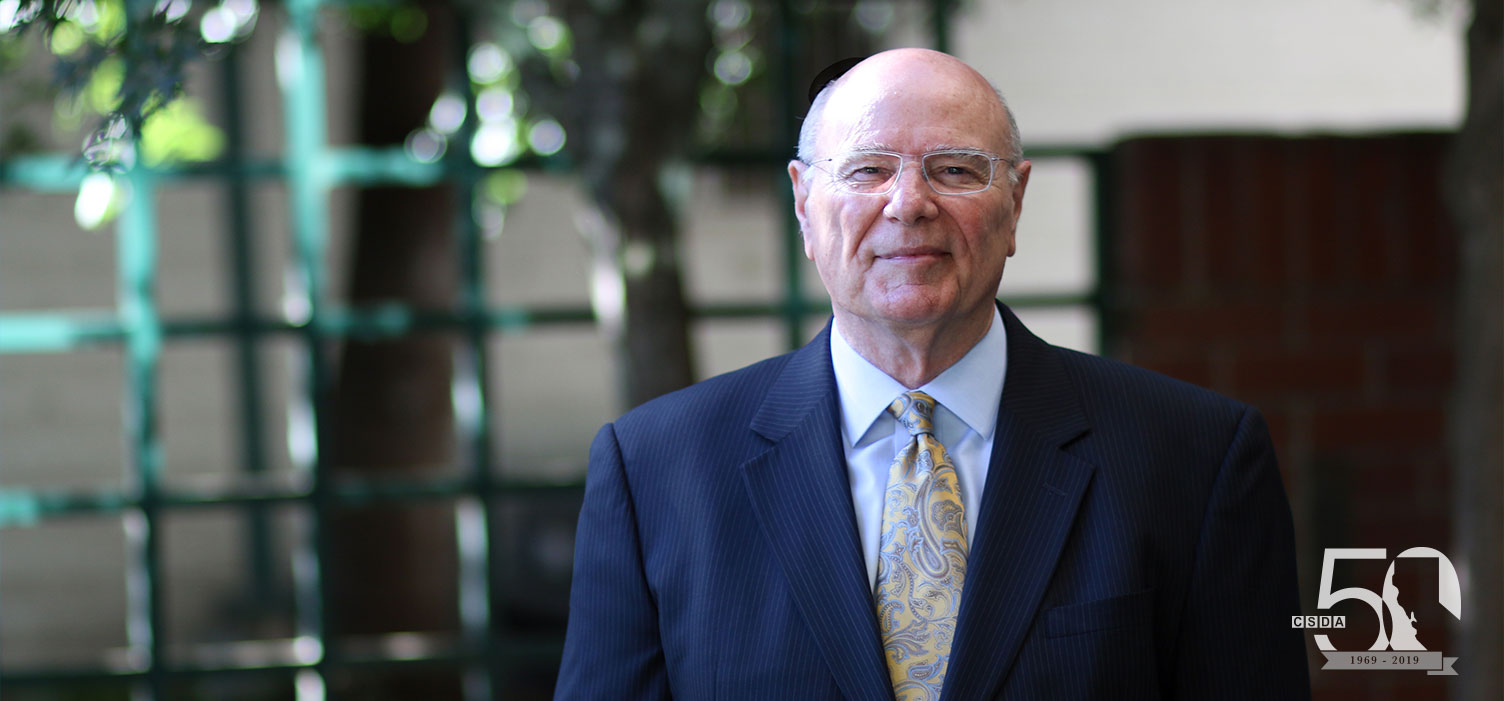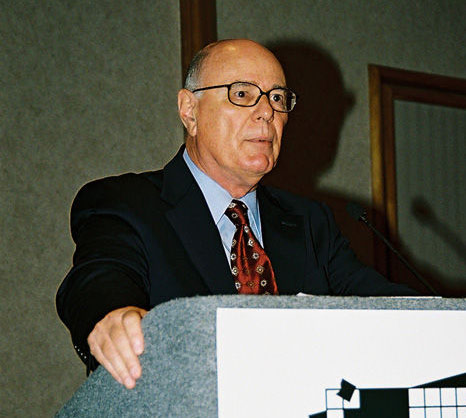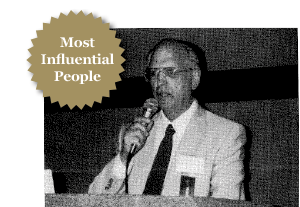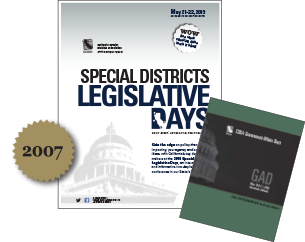
California Special Districts magazine was honored to interview former CSDA Legislative Advocate Ralph Heim, who represented the California Special Districts Association from 1982 to 2008. During these nearly 30 years, he was instrumental in the development of the Advocacy and Public Affairs Department at CSDA and strengthened the voice of California’s special districts in the Capitol. For his many years of dedicated service, Ralph Heim was honored as a recipient of the prestigious CSDA William Hollingsworth Award.
When did you first begin working with CSDA and how did that come about? My first official day with the firm representing CSDA was January 1, 1982. In the spring of 1981, a friend of mine shared that Bob Beckus was going to retire and that the senior partner was looking for someone who might be interested in joining the firm. Long story short, I was their choice. Bob Beckus taught me much about the inner workings of special districts. I was able to communicate with him off and on as issues arose.
You are probably one of the most influential people of CSDA these past 30 years. What is your perspective on CSDA and it reaching this milestone? I had the unique opportunity to watch CSDA grow into an effective advocate for special districts. We had board members who at least every other board meeting would say to staff, “We want to be just like the cities and counties. Why can’t we be more like the cities and counties?” To be fair, the budgetary process wasn’t there. We had to grow the membership to be able to do those types of things. What happened was members who were serving on the board and committees, Catherine Smith and after she left, Neil McCormick, started to focus on programmatic issues designed to educate members. I don’t think there is any question of that growth if you look at the benefits that CSDA now provides to its members – the magazine, the chapters that have been formed, the various seminars, and all the other benefits. There are so many publications and programs that have been developed. Some things had to wait because of the costs of developing the program and staff. There was a commitment made to someday have CSDA have their own in-house lobbyist. I think the most important contributing factor was the board and committee members at the time of this transition. They were motivated and excited about the things we could do.
 Can you share an example of one of your fondest memories from your time working with CSDA and its members?
Can you share an example of one of your fondest memories from your time working with CSDA and its members?Receiving the William Hollingsworth Award at the Annual Conference was clearly the all-time greatest moment of my time with CSDA. For me, nothing will ever be better than that because of who Bill Hollingsworth was and how much I appreciated him.
There was another moment that probably taught me more about myself and CSDA. Betty Harrison Smith from Shasta County was the president of CSDA that year. I used to travel around the state and visit with the various chapters to bring them the latest goings-on in Sacramento. She asked that I come up to Weaverville and speak to the chapter in Shasta County. As I pulled up to the meeting site at the American Legion Hall, I saw there were just six or seven cars in the lot. The front of the facility was a dining room that was open every night for dinner – there were probably 20 people having dinner. What struck me was that this was connected to our meeting space and there was no door to block it off. There were eight people from special districts there in attendance. I learned that getting around Shasta County was not the easiest thing to do, so these eight people made a significant effort to be there. After our scheduled time, President Smith got up and thanked me. I actually got more applause from the diners who started moving their tables closer and were hanging on every word. Each of the eight people who were there came up and in the most heartfelt way, almost embarrassingly, thanked me for doing this. They couldn’t afford to come to Sacramento or didn’t have the technology that allowed them to access all the resources CSDA has. I had a good three hour drive back to Sacramento thinking about that. It slammed me to a point where I realized this is what it’s all about. What I do is not about me; it’s about providing a service to people. It’s a moment that I still remember. There were many fond moments, but this one really touched my heart.
During your time as CSDA’s Legislative Advocate, what do you consider to be some of the biggest victories? What were some of the biggest lessons learned? In my first couple of years as CSDA’s Legislative Advocate, there were bills introduced that would have granted LAFCO broad new authority to reorganize, consolidate, and change management. There was a hearing process and a protest requirement that was significantly higher than the current requirement. The first couple years we were able to fend off those bills, and those were certainly victories. I learned over time that sometimes victories lead to other problems. In 1986, the California Association of Local Agency Formation Commissions (CALAFCO) approached newly elected Assembly Member Mike Gotch from San Diego, recognized as knowledgeable about local government, including special districts, to sponsor legislation CSDA and other special districts associations would certainly oppose. Gotch held a meeting with the CALAFCO lobbyist, the CALAFCO CEO, and me to share that he would only carry the CALAFCO bill if LAFCO allowed special districts to be on LAFCO. After some difficult discussions over a contracted period, CSDA, Association of California Water Agencies (ACWA), and several other special district organizations reached a good compromise including the ability for special districts in each county to create a special districts committee to vote whether they wanted to join LAFCO. We got the bill through, the governor signed it, and we thought there would be a rush of districts passing the necessary resolutions; but what some discovered quickly that LAFCOs’ budgets were primarily funded by the cities and counties, so now special districts would also share in the LAFCO budget. Some felt they would be out-voted by the cities and the counties, so they didn’t apply. LAFCO was always a major issue, but we did have early victories.
How do you think the perspective of CSDA has changed in the State Capitol over these past 50 years?Legislators’ reaction and impression of special districts from then to now is significantly better. Legislators used to think there were too many special districts, and there were bills that attempted to reduce them. The perspective of CSDA and special districts has changed primarily because of the better education that has taken place. Now when new legislators come, there are packets and meetings provided to educate them. Special districts are being proactive and meeting with candidates running and building relationships with their legislators.
Who do you feel were the most influential people of CSDA and why?
There were so many who were instrumental in the growth and the success of CSDA, but two who had particular importance to me. The first is obvious, William Hollingsworth from Olivenhain Water District in the San Diego area. Bill Hollingsworth got a call from a San Diego senator who said there’s a legislator who’s going to introduce a bill to dissolve all the special districts in the State. A small group of special district managers, including Bill Hollingsworth and Bob Beckus met in San Francisco to develop how they were going to go about killing the bill. They agreed there should be a name for the group and Bill Hollingsworth said, “Let’s keep it what it is, the California Special Districts Association.” For 20 years, the soft-spoken gentleman that Bill Hollingsworth was, was one of the most profound teachers of governance. How to govern in the world of special districts and how to treat people -I learned so much from him. The second person is Harry Ehrlich. I felt CSDA was the only statewide association that didn’t have a full-time, in-house lobbyist. I had suggested that at the board retreats, but it was always a matter of someday but not now. One of the individuals who stepped up on this issue was Harry Ehrlich from Olivenhain Water District. Ehrlich took the idea of having an in-house government affairs program to the point where it happened. I think there were others who felt equally its importance, but had Ehrlich not been as passionate about it, it may have taken longer to come into being. There were so many influential people, but if I had to choose two it’s William Hollingsworth and Harry Ehrlich.
Without a doubt, the impact that CSDA has had on me has been because of the incredible people that I’ve met who unselfishly gave so much of their time.
What does CSDA mean to you?
To me, CSDA is family. It will always have a warm place in my heart. Lobbying is a business of relationships, both with legislators and staff, but also with clients. Without a doubt, the impact that CSDA has had on me has been because of the incredible people that I’ve met who unselfishly gave so much of their time. I got to watch an organization that could have been stuck in the 1970s, but the membership chose not to let that happen. If anybody should be proud of the 50th anniversary milestone, it’s those who made this happen. I’m just grateful that I had the opportunity to come along for the ride.
 What advice do you have for CSDA and its members as they look forward to the next 50 years?
What advice do you have for CSDA and its members as they look forward to the next 50 years?You never want to stop looking back and learning from the past to make sure that you better understand the future. You cannot stop growing and must do it smart. Never take your eye off what you’re in business to do - and that’s to serve your membership. Organizations that forget their core responsibility tend to not survive. CSDA has the kind of leadership that is not going to let that happen. People want government close to them. I think special districts are going to be around for a very long time.
#FeatureNews#Conferences